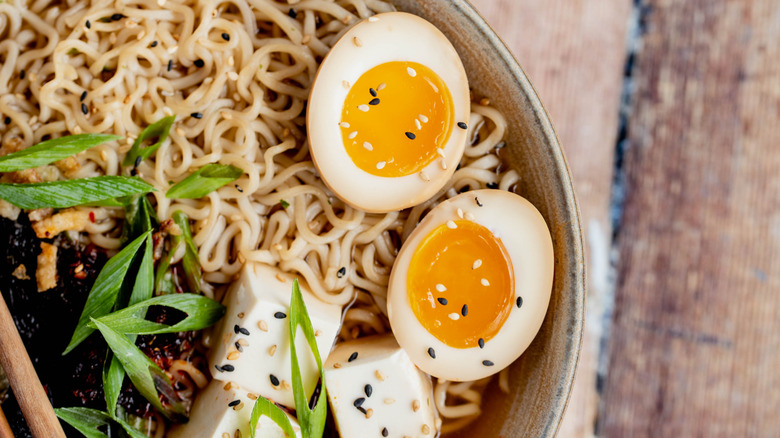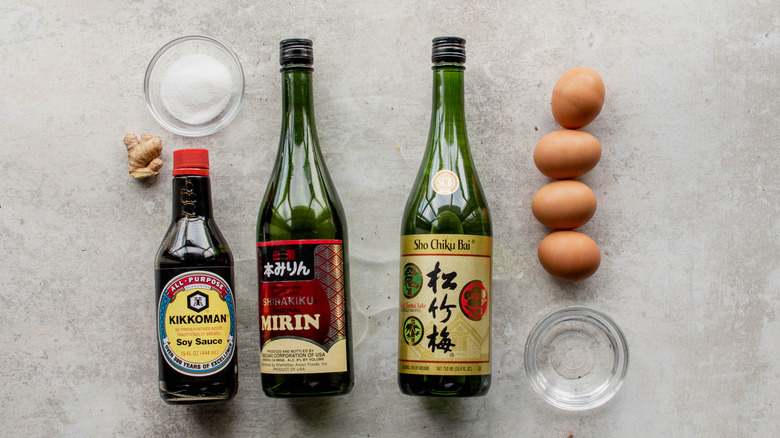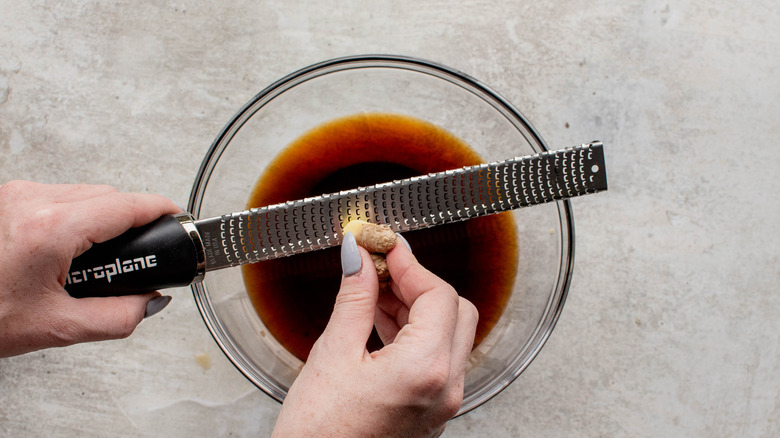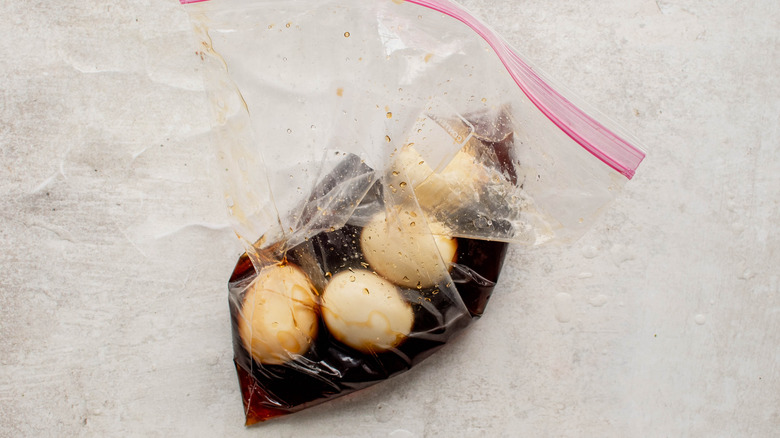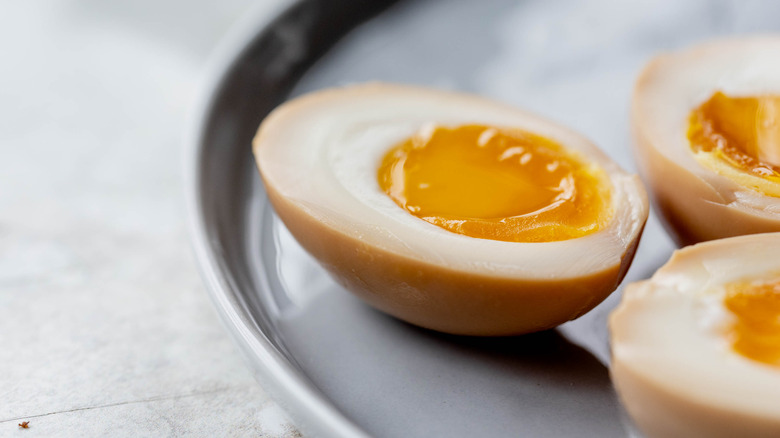Ajitsuke Tamago (Ramen Egg) Recipe
A word of warning here: this recipe takes two or three days! But don't worry too much, most of the time is spent waiting as the eggs marinate, not doing any hands-on prep or cooking. And a bit of encouragement for anyone scared by the intricacies of Japanese cooking, too: you can do this! Recipe developer Michelle McGlinn says: "I was super intimidated by ajitsuke tamago for a long time. I am still intimidated by a lot of the ramen process — tonkotsu broth still gives me nightmares. But I shouldn't have thought twice about these eggs: they are so easy."
McGlinn goes on to highly recommend starting with these eggs if you're a homemade ramen novice. You really can't go wrong in the cooking process, and "having a flavorful, marinated, jammy ramen egg will make any ramen a million times better," says McGlinn. Take one look at the photos McGlinn snapped of her own ramen eggs and you'll agree they are worth the time. Take one taste, and you'll know you were right!
Gather your ingredients for ajitsuke tamago
To make your very own ramen eggs, you'll need a few large eggs. You'll also need warm water, granulated white sugar, soy sauce, saké, mirin, and freshly grated ginger.
"This is an authentic ramen egg, so it uses saké, mirin, soy, and sugar," McGlinn says. "Often ramen eggs will have used dashi, which adds umami, but is hard to find and use. I used ginger for a little added flavor instead. You can use fresh or powdered ginger for a little sweet spice." She also notes that you can adjust the sake and mirin amounts, and even just use one entirely if you can't find the other. Finally, McGlinn actually recommends using a cheaper sake, as "they are better to cook with than expensive sakés with delicate flavors."
Begin boiling the eggs and make the marinade
First, bring a large pot of water to boil over medium heat, then carefully add eggs to boiling water — use tongs or a spoon. Cover the pot and set a timer for 5 minutes and 50 seconds — yes, you need to be precise!
While the eggs are boiling, create your marinade. Whisk the warm water and sugar in a small bowl until the sugar is dissolved, then add the soy sauce, saké, and mirin and whisk to combine them all. Next, grate the ginger into the sauce mixture and whisk to combine. Then carefully transfer the marinade to a large plastic bag or deli cup and set aside.
Chill the eggs, then peel and marinate
Prepare an ice bath of cold water and ice. Once the eggs have boiled for the allotted 5 minutes and 50 seconds, remove them from the heat and place each egg into the ice bath. Once the eggs are cool to touch, peel them and place the peeled soft-boiled eggs into the prepared marinade container. Submerge eggs in the marinade, tying the bag closed to keep eggs submerged. Now place eggs in the refrigerator and marinate them for two to three days.
"The only difficult part of this recipe is cooking the soft-boiled eggs," McGlinn says, adding: "And yes, it's a long wait to find out if you did it correctly! My best advice is to use a fairly large pot so that the eggs don't hit against each other or the side of the pot when cooking, as it causes them to break, which may compromise your egg. However, if you notice an egg has cracked but is still intact, peel it anyway! There's a good chance it cracked towards the end of the boil and will taste just fine." Also, she advises to have the ice bath ready to go so you can transfer the eggs straight away when they're done cooking.
Wait for days, then enjoy
Two or three days later, once eggs are ready, they will be deep tan colored. Remove them from the marinade and cut each in half using a sharp knife. Serve with ramen. And enjoy!
"They will keep for [an additional] two days," McGlinn says. "If you aren't eating them all at once, I'd recommend leaving them whole and in the marinade for one to two days after the initial three. Since they are soft boiled and peeled, they are especially weakened to imposing bacteria. Keeping them whole and tightly sealed helps, but if you aren't sure, better to err on the side of caution and throw them away."
One more thing from McGlinn: "You can certainly eat the eggs after just a couple of hours in the marinade. Of course the flavor intensifies over time, but I have definitely had these in a rushed three-hour marinade, too — still good!"
Ajitsuke Tamago (Ramen Egg) Recipe
No bowl of ramen is complete without ajitsuke tamago, AKA a perfectly flavorful, soft-boiled egg!
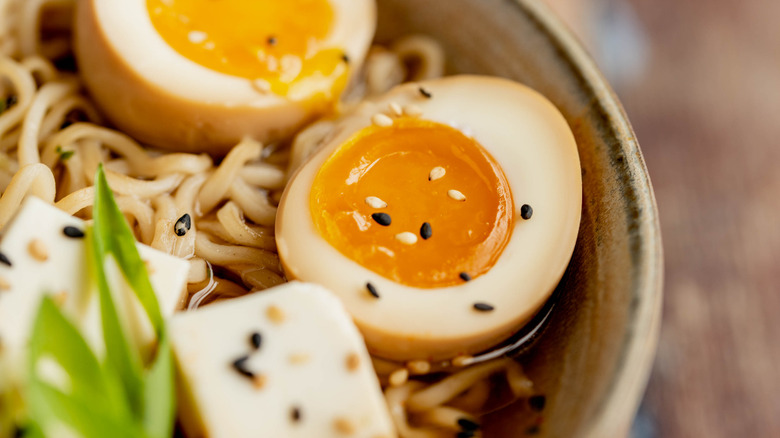
Ingredients
- 4 large eggs
- ¼ cup warm water
- 2 tablespoons granulated white sugar
- ¼ cup soy sauce
- ¼ cup saké
- ¼ cup mirin
- ½ inch fresh ginger, grated
Directions
- Bring a large pot of water to boil over medium heat, then carefully add eggs to boiling water. Cover and set a timer for 5 minutes and 50 seconds.
- While the eggs are boiling, create your marinade. Whisk the warm water and sugar in a small bowl until the sugar is dissolved, then add the soy sauce, saké, and mirin and whisk to combine. Grate the ginger into the sauce mixture and whisk to combine.
- Carefully transfer the marinade to a large Ziploc bag or deli cup and set aside.
- Prepare an ice bath of cold water and ice. Once the eggs have boiled for the allotted 5 minutes and 50 seconds, remove from the heat and place each egg into the ice bath.
- Once cool to touch, peel the eggs and place peeled soft-boiled eggs into the prepared marinade container. Submerge eggs in the marinade, tying the bag closed to keep eggs submerged.
- Place eggs in the refrigerator and marinate for 2 to 3 days.
- Once eggs are ready they will be deep tan colored. Remove from the marinade and cut in half using a sharp knife. Serve with ramen.
